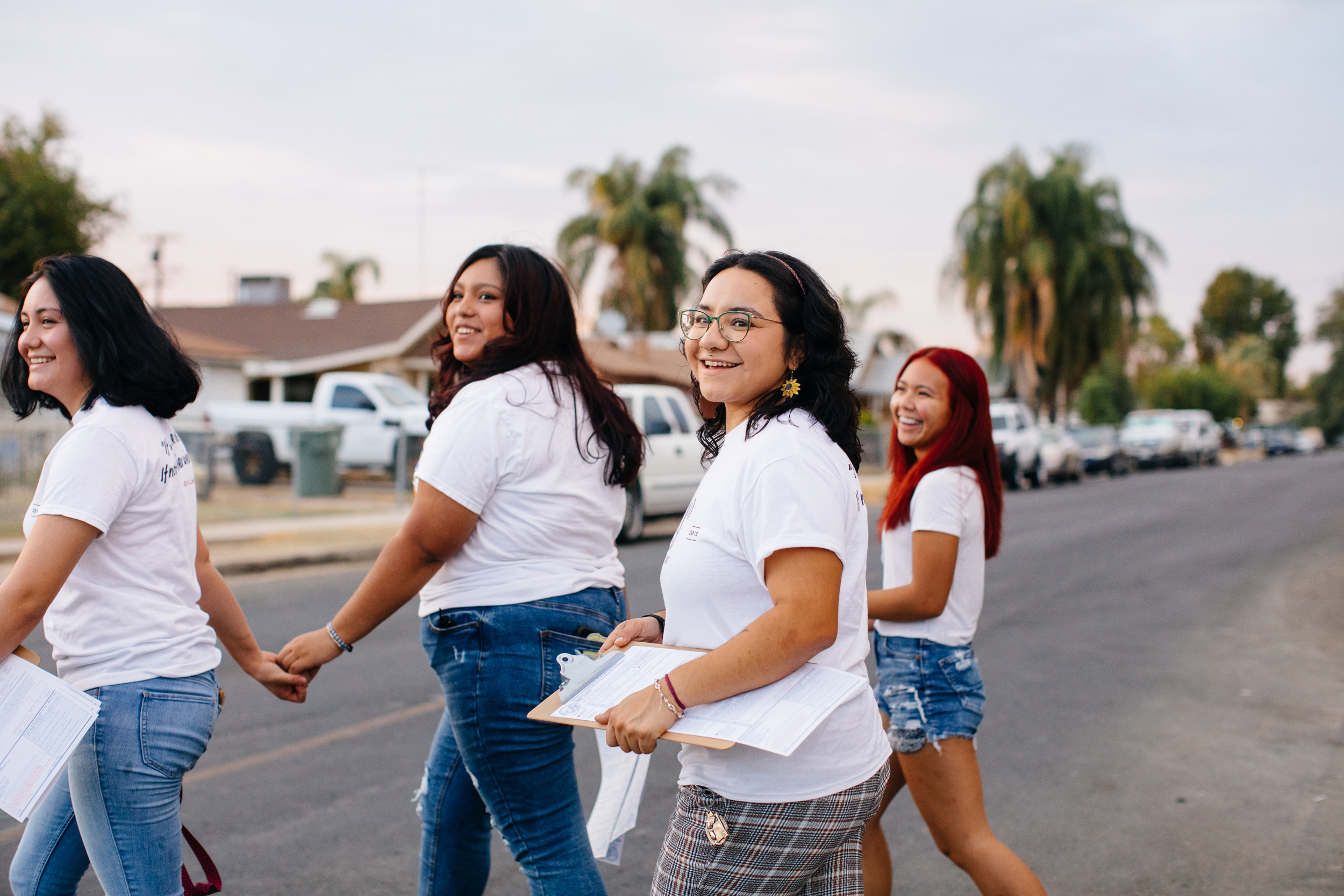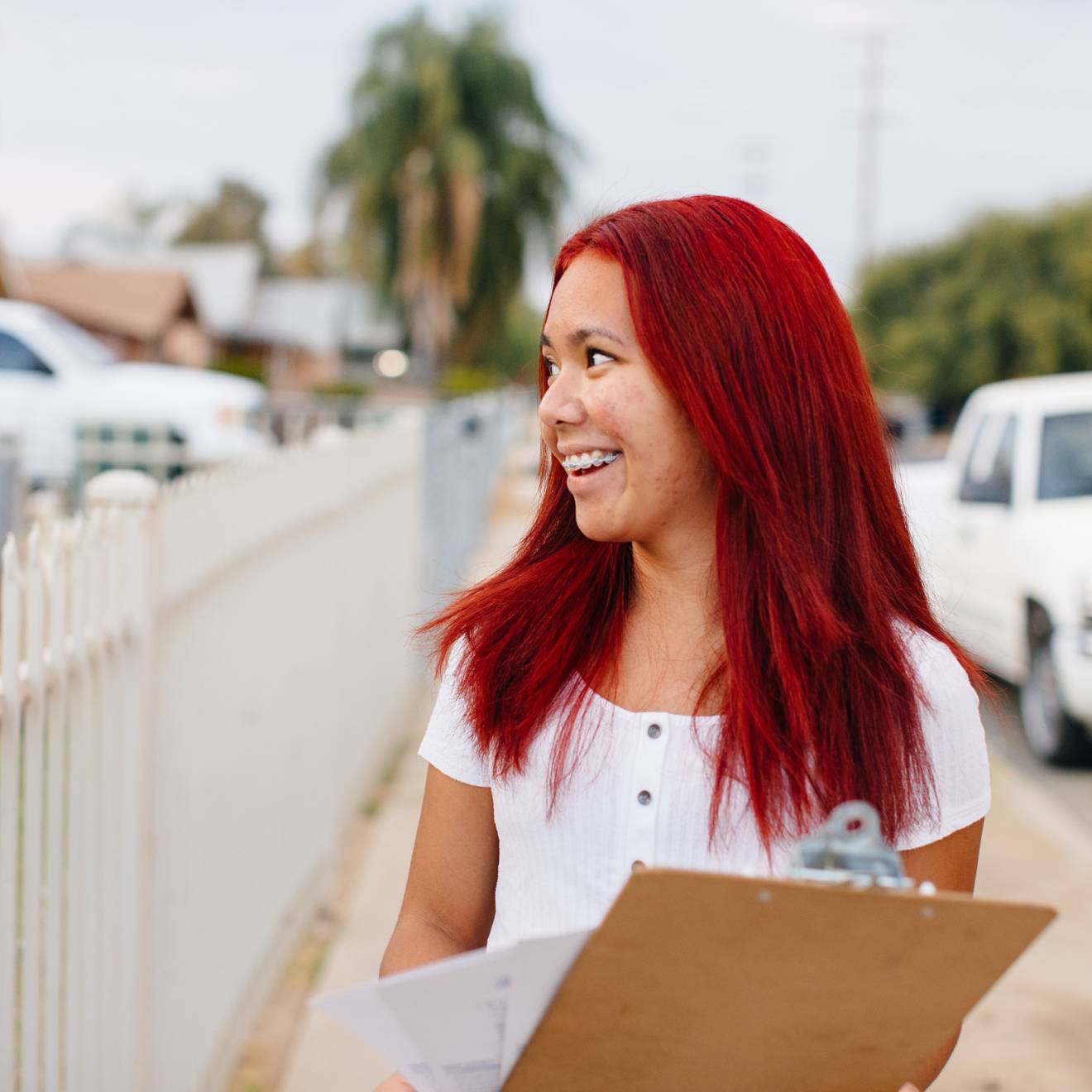On a recent summer evening, a group of UC students headed out into the streets of Delano, California, armed with clipboards, placards and a message of change.
In the rural California community where Cesar Chavez once launched the farmworker movement, these students were looking to activate a different kind of political power — by registering young people to vote.
“Everyone here works in the scalding heat, young or old, even people who should be retired,” said Delano teenager Montserrat Romero Hernandez. “I saw that, and it hurt.”
Romero Hernandez said that for a long time, she, like many others in her community, thought voting wouldn’t make a difference. “But I realized my anger wasn’t doing anything. And if we — the youth here — aren’t going to do what it takes to help our community, no one else is.”
What changed her mind: hearing from UC students about the difference her vote could make on local issues.
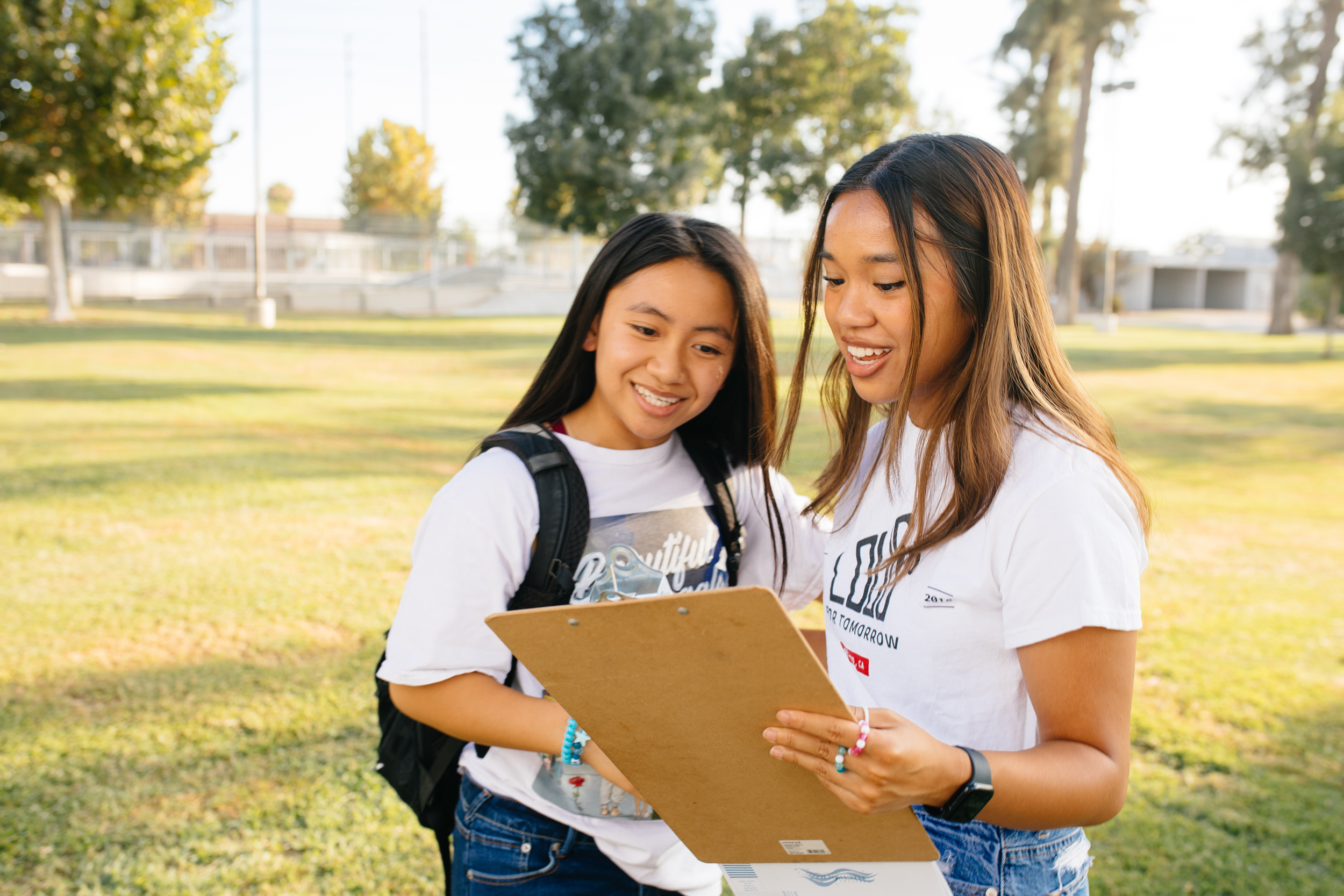
“A lot of people in our area are in survival mode,” said Delano native Charlene Faye Cubangbang, who is now starting her second year at UCLA majoring in political science. Cubangbang is part of UC Freedom Summer, which brings students from communities with low voting rates back home for the summer to perform voter outreach.
“I tell people: If you’re sick of the potholes on Browning Road, if you want someone to fight for more textbooks and to fix the broken desks, you need someone to push for you, and a way to do that is through voting,” Cubangbang said.
Inspired by the 1964 Freedom Summer Project to register Black voters in the South, UC Freedom Summer began in 2018 in with 25 students from UC Santa Cruz and UC Merced doing voter outreach in the Central Valley. It now includes more than 100 students from all nine undergraduate campuses, as well as some California community colleges, fanning out to encourage civic participation in communities across California, from Visalia to Oakland and East San Jose.
Participants plan events and set registration targets aimed at potential young voters in their communities as part of a summer-long internship focused on civic engagement.
The idea: Educate youth in these communities about the importance of voting, and they’ll soon bring their friends and families along.
“People trust us. They’ve known us since elementary school, and they know we care about the community,” said Cubangbang. “For me, this is full circle. It’s coming back to my roots.”
Meeting voters where they are
Freedom Summer was founded by UCLA Chicano Studies professor Veronica Terriquez. She launched the program as a faculty member at UC Santa Cruz and has since expanded it to include all UC campuses, California Community Colleges and concurrently enrolled high school students.
“Seven out of 10 young people in California are young people of color,” Terriquez said. “Engaging them is an important part of building an electorate that effectively represents the people of the state.”
Given their growing numbers, young voters could exert significant influence if they began actively turning out. Yet youth, especially those of color, have tended to be less mobilized than other groups, Terriquez said.
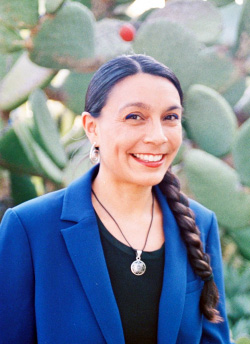
UCLA Chicano Studies professor Veronica Terriquez.
There are many reasons for this. High school students in low-income communities often get little education about voting and civic participation works. And their participation is not always encouraged. For example, during Freedom Summer, some students have encountered resistance from local high schools to efforts like holding non-partisan education and registration drives on campus.
Young people and those from low turnout areas are also the least likely to be contacted by political campaigns.
“We end up with a vicious cycle, where communities don’t vote because they’re never contacted, but we’re never contacted because we don’t vote,” said Randy Villegas, a UC Santa Cruz alum who participated in the first Freedom Summer. Now a faculty member with College of the Sequoias, Villegas has led several of his own community college students to take part in the Freedom Summer program.
“We want to meet folks where they’re at, whether that be at a local swap meet, outside of grocery stores or even knocking on their door,” he said. “We’re big on scaffolding the process: What do these words mean, how do you find out who your representatives are and how do you contact them? How do you attend a city council or school board meeting, and what kinds of decisions do they make?’
Putting youth on the ballot
“In high school, you really only talk about voting when the presidential election rolls around,” said UCLA global studies major Kennedy McIntyre, who grew up in a low-income neighborhood in Sacramento.
As part of her voter outreach efforts, McIntyre worked to put a local measure on the ballot that would allocate a portion of revenue from cannabis taxes toward youth programs. Beyond the measure itself, McIntyre sees the effort as a way to educate young people that issues on the ballot directly affect them.
“We want youth to know they have a voice, and a big way their voice can be heard is through voting,” she said. “Local elections are sometimes lost by two or three percent, and that difference could be your vote.”
Jose Orellana was majoring in business at UC Santa Cruz when he saw a flier for Freedom Summer in 2018. Intrigued by the idea of an internship in his hometown, he signed up for the program.
He ultimately switched his major to critical race and ethnic studies. Upon graduating, he went back to the Central Valley and co-founded Loud for Tomorrow, an organization that carries the Freedom Summer message forward by engaging young people in the civic process.
Orellana is a self-proclaimed introvert who hates public speaking, but Freedom Summer sparked something in him. “These are some of the hardest working people in the state, with some of the fewest resources,” he said. “We shared this vision that the Central Valley deserves more.”
‘This is the way to make change’
Though it’s hard to put a number on it exactly, Terriquez estimates this year’s Freedom Summer has registered or pre-registered over 5,000 new voters.
Just as important, participants say, is how the program has empowered young people in underserved communities to take part in the political process and have a sense of agency over their future.
One of those is Romero Hernandez. No longer apathetic, she now volunteers with Loud for Tomorrow and is constantly talking to her high school classmates about the value of civic participation.
“I saw how this community wasn’t taken care of, especially the youth. We’ve had family members lose their jobs or their houses. I know the fear many of us carry that our [immigrant] parents will go out one day and just not come home — how your heart sinks if they take too much time at the grocery store,” she said.
“But there’s one way to fix the things we don’t like — and that’s by voting. As irritating and slow as it is, it’s the way to make change.”
—
Top photo credit: Elena Zhukova/University of California
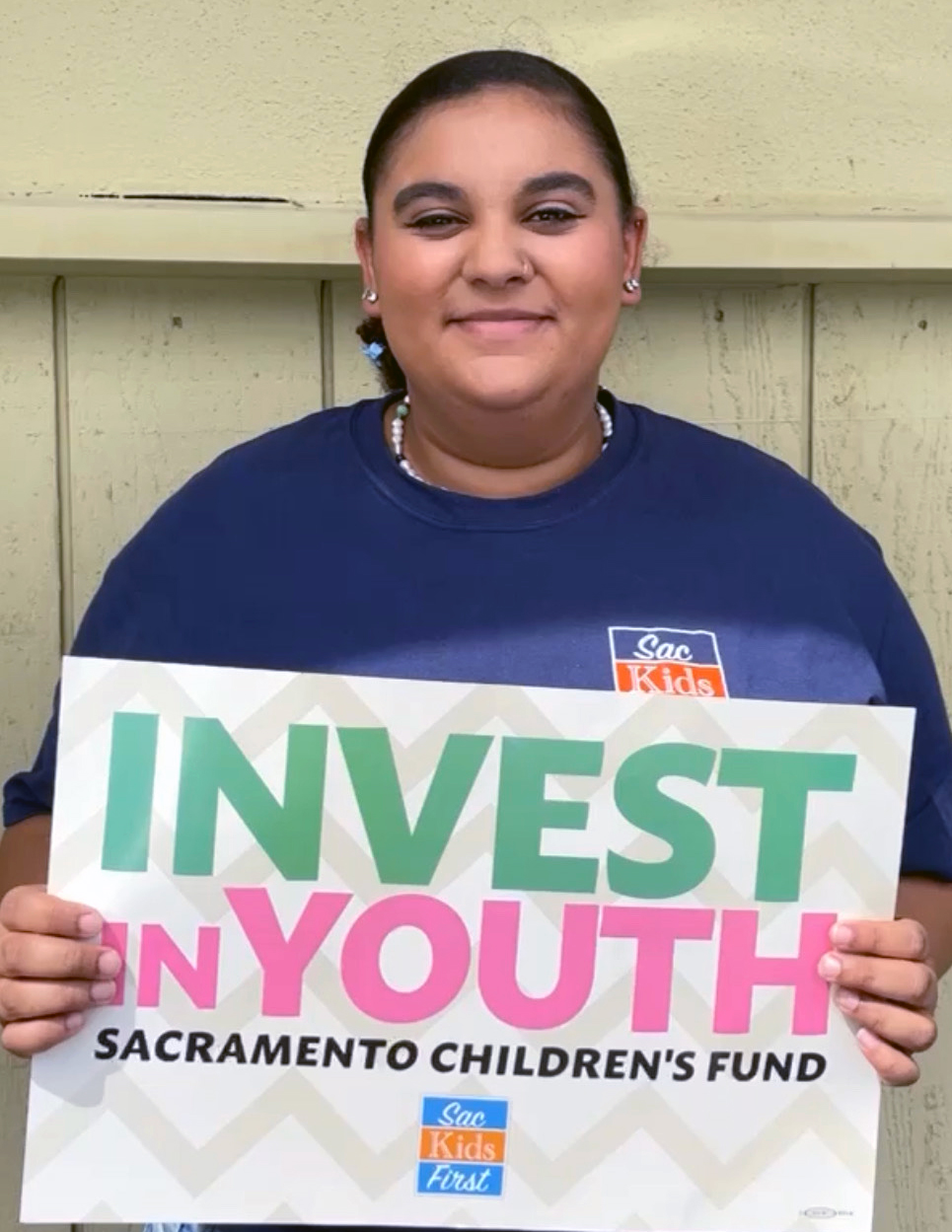
Kennedy McIntyre, UCLA global studies major and young activist in Sacramento.
